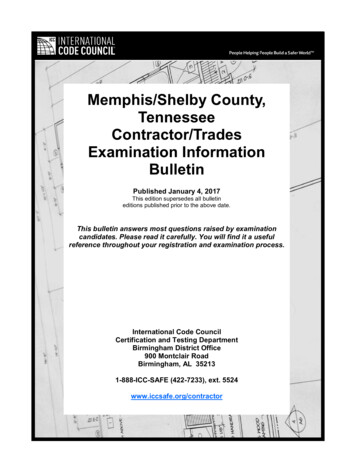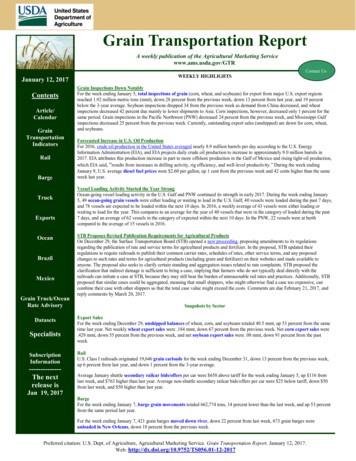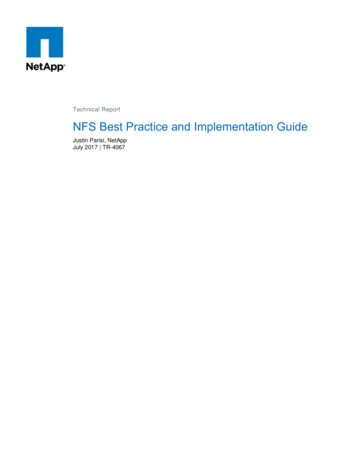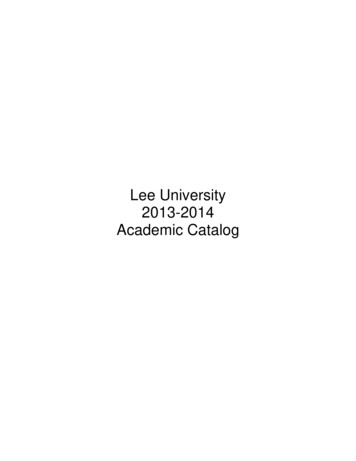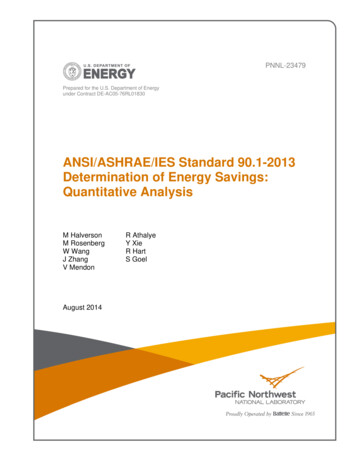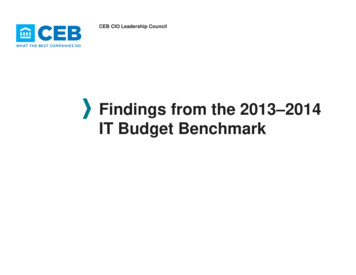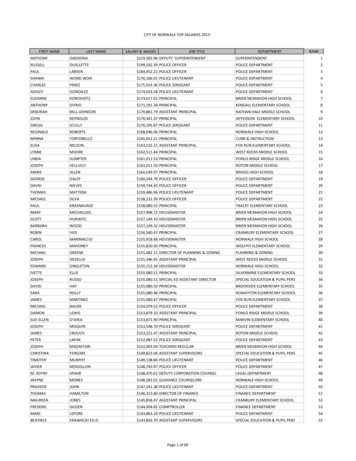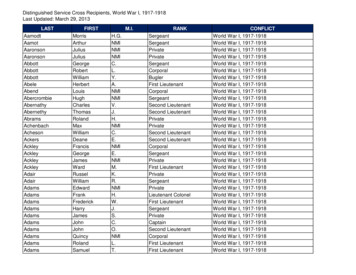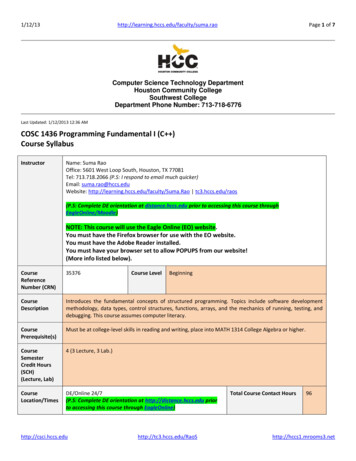
Transcription
ge 1 of 7Computer Science Technology DepartmentHouston Community CollegeSouthwest CollegeDepartment Phone Number: 713-718-6776Last Updated: 1/12/2013 12:36 AMCOSC 1436 Programming Fundamental I (C )Course SyllabusInstructorName: Suma RaoOffice: 5601 West Loop South, Houston, TX 77081Tel: 713.718.2066 (P.S: I respond to email much quicker)Email: suma.rao@hccs.eduWebsite: http://learning.hccs.edu/faculty/Suma.Rao tc3.hccs.edu/raos(P.S: Complete DE orientation at distance.hccs.edu prior to accessing this course throughEagleOnline/Moodle)NOTE: This course will use the Eagle Online (EO) website.You must have the Firefox browser for use with the EO website.You must have the Adobe Reader installed.You must have your browser set to allow POPUPS from our website!(More info listed below).CourseReferenceNumber (CRN)35376CourseDescriptionIntroduces the fundamental concepts of structured programming. Topics include software developmentmethodology, data types, control structures, functions, arrays, and the mechanics of running, testing, anddebugging. This course assumes computer literacy.CoursePrerequisite(s)Must be at college-level skills in reading and writing, place into MATH 1314 College Algebra or higher.CourseSemesterCredit Hours(SCH)(Lecture, Lab)4 (3 Lecture, 3 Lab.)CourseLocation/TimesDE/Online 24/7(P.S: Complete DE orientation at http://distance.hccs.edu priorto accessing this course through EagleOnline)http://csci.hccs.eduCourse LevelBeginninghttp://tc3.hccs.edu/RaoSTotal Course Contact Hours96http://hccs1.mrooms3.net
ge 2 of 7InstructionalMaterials(Textbook)Course is taught in C . Textbook information will be provided by individual instructor For C : Starting out with C Early Objects 7th Edition (formerly "Alternate Version"). Authors: Gaddis,Walters & Muganda. ISBN: 10:0136077749, 13:9780136077749. Publisher: Addison-Wesley.InstructionalMethods(select one)Distance (100%)Course Length (number of weeks)Type of Instruction (Lecture,Lecture/Lab, COOP, PracticumLecture/Lab,16 WeeksCourse Requirement, Policy, and Course CalendarInstructor'sRequirements1. TEXTBOOK – You must purchase the textbook from an HCC bookstore, as the book comes in abundle with other required information. More information is covered within the second topic of thecourse in EagleOnline (EO) or Moodle. In addition, you must obtain the books during the second weekof course, at the latest, by the end of the 3rd week or you will fall very behind.2. Adequate Windows PC hardware including a 1 GHz or faster CPU, 1GB or more of RAM, graphicscard with 128 MB of memory, 4 GB of disk storage space and handle multimedia items (sound andmaybe a microphone [suggested but not required this semester]).3. Windows PC4. Windows Operating System: Windows XP – SP2, Window Vista, or Windows 75. High speed Internet access (DSL or cable - dial up will NOT work)6. Text Editing software like NotePad, WordPad, or MS Word7. Web Browser: Firefox for accessing EO Course Work (free online @ http://www.mozilla.org/enUS/firefox/fx/)8. REAL PLAYER software (free online @ http://www.real.com/)9. Adobe Reader software (free online at http://www.adobe.com)10. Visual Studio IDE (FREE online @ . You must be self-motivated in order to be responsible for completing work on time, and withoutconstant reminders. This class moves at a fast pace and staying ahead of schedule is the key toremaining on track.12. You must have access to the necessary computer resources stated above. Please note, thenetwork or computer going down the night before an assignment is due is NOT a valid excuse.Assignments have ample lead time before the Official Due Dates to allow for these types ofsituations. Start work early and upload your work early and you should not have a problem. If p://hccs1.mrooms3.net
ge 3 of 7have internet or computer problems you must be willing to use other resources, such as the HCC openlabs.13. STUDENT ATTENDANCE/PARTICIPATION IS MANDATORY: As a DE section of this topic, you mustmake satisfactory progress in this course. Students may be withdrawn if the student misses turningin assignments that total to more than 89 points (which is more than 12.5% of the course work priorto the Final Exam). Contact the instructor if you are having a problem (our course is on a 1000 pointscale). If you decide to quit participating in the course before the Last Day for Administrative/StudentWithdrawals, you may withdraw yourself, or ask instructor to withdraw you. After the withdrawaldate deadline, the instructor is not able to withdraw you. If you quit participating in the course afterthe Last Day for Administrative/Student Withdrawals, you will receive an F. This will apply to allstudents. Incomplete grades are rarely given.14. PROFESSOR PARTICIPATION: I will normally respond to student requests between 1-3 days.Instructors are usually allowed up to two weeks to grade assignments, however, I will try to grade labassignments within 7 days after the due date. All quizzes are self graded and students can see theirresults immediately. I will read all EO “eMail” every time I enter the course and normally will respondthat same day. Thus, as your Professor, I expect to have regular contact with you during thesemester. Most of this contact will be electronically within EO environment. Most interaction will bevia the eMail, and Forum tools within EO.15. ACAMEDIC DISHONESTY/STUDENT HANDBOOK: Please refer to student hand book regardingcheating. Students may ask questions to other students, to myself, or to anyone else. This is how welearn and I encourage it. HOWEVER, all work must be started and completed in its entirety on yourown. If it is found that students are sharing the same files, and then making minor changes to uploadthe work as their own, students will receive a 0 on the assignment and may possibly be removed fromthe class.The Distance Education Student Handbook contains policies and procedures unique to the DE student.Students should have reviewed the handbook as part of the mandatory orientation. It is the student'sresponsibility to be familiar with the handbook's contents. The handbook contains valuableinformation, answers, and resources, such as DE contacts, policies and procedures (how to drop,attendance requirements, etc.), student services (ADA, financial aid, degree planning, etc.), courseinformation, testing procedures, technical support, and academic calendars. Refer to the DE StudentHandbook by visiting this link: http://de.hccs.edu/de/de-student-handbook.16. EGLS3 -- Evaluation for Greater Learning Student Survey SystemAt Houston Community College, professors believe that thoughtful student feedback is necessary toimprove teaching and learning. During a designated time, you will be asked to answer a short onlinesurvey of research-based questions related to instruction. The anonymous results of the survey will bemade available to your professors and division chairs for continual improvement of instruction. Lookfor the survey as part of the Houston Community College Student System online near the end of theterm.17. MENINGITIS IMMUNIZATION REQUIRED FOR SPRING REGISTRATIONTexas Senate Bill 1107 passed in May 2011, requires that new HCC students and former HCC studentsreturning after an absence of at least one fall or spring semester who are under the age of 30 arerequired to present a physician-signed certificate showing they have been vaccinated against bacterialmeningitis. Beginning with Spring registration, November 7, students will have to satisfy thisrequirement prior to enrollment. For more information and a list of exemptions please go -meningitis-documentationEagle OnlineRequirementshttp://csci.hccs.eduEAGLE ONLINE DELIVERY OF INSTRUCTION: This course is partly delivered to the student using EO(educational delivery software). Basically, the EO website is where you will go to enter our virtualclassroom. To open EO website you will need to use the Firefox s3.net
ge 4 of 7Eagle Online USER ID: Your EO login user ID will be your HCC User ID (sometimes referred to as the“W” number). All HCC students have a unique User ID. If you do not know your User ID you can lookit up by visiting the HCC home page. Please note, this is the same user id you may have used forBlackboard, but it will NOT be the same password. If you have never logged into EO at HCC before, thepassword will be “distance”: To log into EO, go to http://distance.hccs.edu and click on the Course/Go To Class link. MAKESURE AND COMPLETE THE ORIENTATION FIRST!You may click here for extra login help.Eagle Online TECHNICAL HELP: Go to http://distance.hccs.edu and click on the EO Help Desk link.Within our EO course there is also a blue HELPDESK button located at the top p of the course.POP UP? If a pop-up is blocked, you will need to set your pop-up blocker to allow pages from our EOsite. The technical requirements section of the orientation will discuss how to allow pop-ups fromEO. The HELPDESK button will explain this as well, located at the top of the course. Do this beforebeginning our course as many of the early links in the course are pop-ups!Instructor GradingCriteriaTotal Points (Percentage)Grade 900 ( 90%)A800 - 899 (80% - 89.9%)B700 - 799 (70% - 79.9%)C600 - 699 (60% - 69.9%D0 - 599 (0% - 59.9%)FCourse CalendarDUE DATE TIMES ARE 11:55pm on the day they are due (Every Wednesdays)!Note: You have two different types of assignments in this course. EO Quiz (EOQuiz) which you upload through EOand is automatically graded. The other assignment is EO Lab (EOLab) that you will do on your PC using VisualStudioIDE and upload into EO for me to grade. Not all topics will have this type of assignment/quiz. Some topics will haveno assignment (topic 1 ), some will have only EOQuiz (topics 2 & 14), some topic(s) will have only EOLab (topic 3),and most topics will have both EOLab as well as EOQuiz (topics 4 to 13). Below table shows the due dates,assignment type, and grade distribution for each topic in this course.Note: DUE DATE is last possible date assignment can be uploaded. It is highly suggested that you uploadassignments SOONER (On/before the Due Date)Due Dates[Wed]N/AJan 23Jan 30Feb 06Feb 13Feb 20EO Topics01GST – Getting STarted02INT – Introduction03IDE – Integrated Development Environment (VStudio)04CH1 – Chapter1 (Introduction to Computer Programming)05CH2 – Chapter2 (Introduction to C )06CH3 – Chapter3 (Expressions and edu/RaoSAssignment Type &Points DistributionEOQuizEOLabFinal(22%)(53%)(25%)00020 10 (Forum Post)00400154001540015400http://hccs1.mrooms3.net
1/12/13Feb 27Mar 06Mar 20Apr 03Apr 17Apr 24May 01May 01Fri-May03, o07EX1 – Exam1 Online (Chapters 1, 2, and 3)08CH4 – Chapter4 (Making Decisions)09CH5 – Chapter5 (Looping)10EX2 – Exam2 Online (Chapters 4 and 5)11CH6 – Chapter6 (Functions)12CH8 – Chapter8 (Arrays)13CH9 – Chapter9 (Searching and Sorting Arrays)14FEO – Final Exam OverviewPage 5 of 7301515301515152080404080404040000000000FINAL EXAM – Chapters 6, 8, & 9 (WestLoop Campus, Rm# 154)00250TOTAL [1000]220530250Click here For Spring 2013 Holidays and Important DatesLearning Objective, Students Learning Outcome, and Program SpecNote: This section of the syllabus provides the general course learning objectives, the expected students learningoutcome, the course scope in terms of the department program, and the instrument used to evaluate the course. If youhave any question, contact the instructor or the department for answers.HCC Grading ScaleGradeA 100- 90B 89 - 80:C 79 - 70:D 69 - 60:59 and below FIP (In Progress)W(Withdrawn)I (Incomplete)AUD (Audit)GPA Points4 points per semester hour3 points per semester hour2 points per semester hour1 points per semester hour0 points per semester hour0 points per semester hour0 points per semester hour0 points per semester hour0 points per semester hourIP (In Progress) is given only in certain developmental courses. The student must re-enroll toreceive credit. COM (Completed) is given in non-credit and continuing education courses. Tocompute grade point average (GPA), divide the total grade points by the total number ofsemester hours attempted. The grades "IP," "COM" and "I" do not affect GPA.Course Student LearningOutcomes (SLO):1.2.3.4.5.6.http://csci.hccs.eduExplain the purpose of computer programming languageIdentify and explain programming development lifecycle including planning, analysis,design, development, and maintenance.Analyze problems.Design algorithms using pseudo code, flowcharts, and structured charts Explain and useprogramming language elements including syntax, data types, conditional statement,control structures, procedures, arrays, classes, and objects. Create a program based onspecification.Use Integrated Development Environment (IDE) for the editing, building, debugging, andtesting of programs.Apply proper documentation and formatting of source net
arning Objectives1.2.3.4.Student AssignmentsRefer to the Course CalendarStudent Assessment(s)1.2.3.4.5.6.Page 6 of 7Develop programs using fundamental concepts of structured programming.Use software development methodology in program problem solving.Code programs using data types, control structures, functions and arrays.Demonstrate the ability to run, test, and debug programs.Explain the purpose of computer programming language.Assessment criteria under developmentIdentify and explain programming development lifecycle including planning, analysis,design, development, and maintenance.Assessment criteria under developmentAnalyze problems.Assessment criteria under developmentDesign algorithms using pseudo code, flowcharts, and structured charts Explain and useprogramming language elements including syntax, data types, conditional statement,control structures, procedures, arrays, classes, and objects. Create a program based onspecification.Assessment criteria under developmentUse Integrated Development Environment (IDE) for the editing, building, debugging, andtesting of programs.Assessment criteria under developmentApply proper documentation and formatting of source code.Assessment criteria under rs will use syllabus that will satisfy CurricuUNET requirements and improve on-goingassessment of student-centered learning and teaching.Academic Discipline/CTEProgram LearningOutcomes1.2.3.4.5.SCANS and/or CoreCurriculumIdentify the fundamental principles of programming, including those of algorithm analysis,software design, operating systems, and databaseDesign and write computer programs that are correct, simple, clear, efficient, wellorganized, and well documentedKnow and be able to apply important data structures and algorithmsUnderstand the hardware and software aspects of computer systems that supportapplication software developmentDevelop software engineering proficiencySecretary’s Commission on Achieving Necessary Skills (SCANS)1. C1: Allocates TimeStudents will learn to allocate time to perform each task (online course will emphasize thistask more).2.C5: Acquires and Evaluates InformationStudent will be able to identify need for data, obtain it from existing sources or createthem, and evaluate information.3.C6: Organizes and Maintains InformationStudents will learn to organize their assignments and manage to complete them withspecific deadline.4.C18: Selects TechnologyStudents will use flowcharts to understand the subject. Students will select appropriatecompiler to run program.5.http://csci.hccs.eduC20: Maintains and Troubleshoots oms3.net
ge 7 of 7Student will be able to prevent, identify or solve problems in machines, computers, andother technologies.6.F9: Problem SolvingStudents will learn problem-solving methodology (pseudo code).7.F10: Seeing Things in the Mind’s EyeStudent will be able to organize and process symbols, pictures, graphs, objects or otherinformation.Every semester, calendar based weekly learning material (reading, hands exercises for in-class,web enhanced, or online assignments, and scheduled quiz/test/exam) will be posted as part ofthe syllabus.HCC Policy StatementAccess Student ServicesPolicies on their Web sitehttp://hccs.edu/student-rightsDistance Education and/or Continuing Education PoliciesAccess DE Policies on theirWeb siteDE STUDENT SERVICESThe Distance Education Student Handbook contains policies and procedures unique to the DEstudent. It is the student's responsibility to be familiar with the handbook's contents and part ofthe mandatory orientation. The handbook contains valuable information, answers, andresources, such as DE contacts, policies and procedures (how to drop, attendancerequirements, etc.), student services (ADA, financial aid, degree planning, etc.), courseinformation, testing procedures, technical support, and academic calendars. Refer to the DEStudent Handbook by visiting this link: http://de.hccs.edu/de/de-student-handbookAccess CE Policies on theirWeb site for inesCompetencies: If RaoShttp://hccs1.mrooms3.net
1/12/13 http://learning.hccs.edu/faculty/suma.rao Page 2 of 7 http://csci.hccs.edu http://tc3.hccs.edu/RaoS http://hccs1.mrooms3.net Instructional
